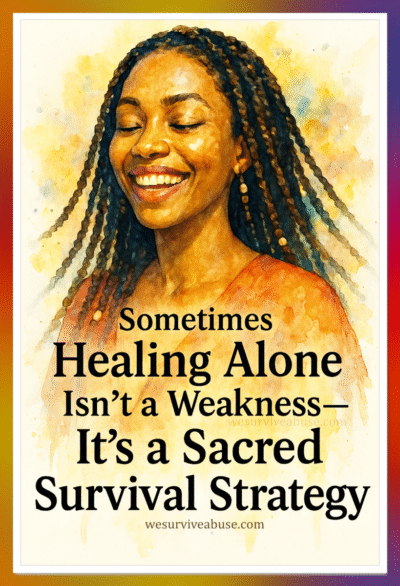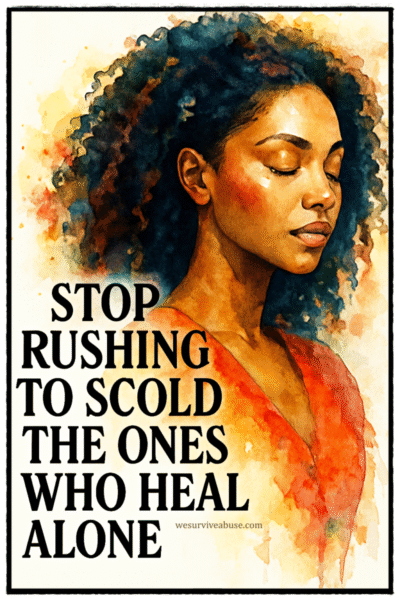Some of us were raised in surveillance. Silence is sacred. Solitude is survival. There’s a rush these days—to gather, to circle up, to "process" ever
 Some of us were raised in surveillance. Silence is sacred. Solitude is survival.
Some of us were raised in surveillance. Silence is sacred. Solitude is survival.
There’s a rush these days—to gather, to circle up, to “process” everything together. And that can be beautiful.
But too often, people—even healers—turn that rush into a scolding.
A side-eye at the woman who pulls away. A judgment cast at the one who needs silence. A whole wave of people whispering that healing in solitude is somehow selfish, avoidant, or “taking the easy way out.”
Let me say this with love and clarity:
For some of us, solitude isn’t a luxury. It’s how we survive.
The Ones Who Were Watched
There are people who grew up in homes where their every word was monitored. Every expression was dissected. Every movement had consequences.
They could never close their doors—some didn’t even have doors.
They were punished for tone. For facial expressions.
Some had their rooms bugged, their journals read, their phones searched.
In today’s world, some live under home surveillance cameras set up not for protection—but for control.
They were never allowed to be fully themselves. Not even in their own bodies.
Not even for a moment.
So now, when they seek solitude to heal—when they finally choose themselves over pleasing everyone else—they’re called cold. Distant. Damaged.
But what if they’re finally free?
Healing Isn’t Always Loud or Public
Western culture has long framed healing as something visible. Something shared.
Support groups. Talk therapy. Big reveals.
And yes, for many, those paths bring life and liberation.
But that’s not the only way.
Across the world, cultures have always honored solitude as sacred:
In many Indigenous nations, vision quests are undertaken alone in nature, in deep spiritual reflection.
In Japanese culture, the practice of komorebi—reconnecting with the self through the beauty of filtered light and trees—often happens in solitude.
African spiritual traditions across the continent encourage time alone to commune with ancestors, spirit, and self before rejoining the community.
In monastic traditions from Thailand to Ethiopia, silence is not emptiness—it is power, discipline, and grace.
These are not escapes. They are returns—to self, to spirit, to truth.
Let Survivors Decide What Safety Feels Like
 If someone walks away from a toxic relationship, a chaotic family, or even a supportive circle because they need silence—they are not failing.
If someone walks away from a toxic relationship, a chaotic family, or even a supportive circle because they need silence—they are not failing.
They are healing.
Peace is not passive.
Solitude is not cowardice.
Silence is not the absence of strength—it is often the root of it.
Some wounds require a quiet room, a locked door, and the holy audacity to finally stop explaining yourself.
Let people have that.
💬 Survivor Affirmation
“I am allowed to heal in silence. I am allowed to choose solitude. I am allowed to walk away without apology. My peace is my birthright, and I honor it—alone or in company.”
If this post speaks to you, share it. Gently. And if you need this kind of silence to heal, take it without shame.
You’re not avoiding life—you’re reclaiming it.
[rosaschildren.com] | [wesurviveabuse.com] | [survivoraffirmations.com]
Share if you feel safe and ready—your voice might be the lifeline someone else needs. And if you do share, remember to cite the messenger. Words carry legacy.
